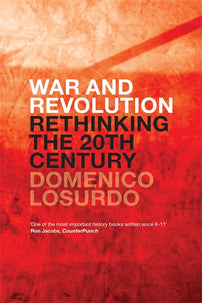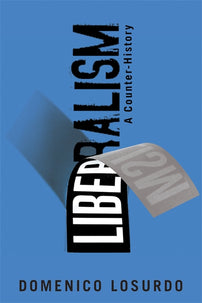Domenico Losurdo: ‘Liberalism, the most dogged enemy of freedom’
The communist militant, philosopher and historian Domenico Losurdo died in June. He worked for many years on the history of liberalism, as he sought to rethink the processes of emancipation. In this 2013 interview for l’Humanité he revisited the themes of his Liberalism: A Counter History.

‘As a communist – and not only that, but also as a philosopher and historian – I am going to fight and continue to fight the dominant ideology. For the dominant ideology is a manipulation of history and an obstacle to the process of emancipation. And we, for our part, have to rethink this process itself’. Such were Domenico Losurdo’s words in his talk at the books section of the 2007 Fête de l’Humanité, which he had been invited to address for the first time upon the invitation of the Fondation Gabriel-Péri. A professor at the University of Urbino, Domenico Losurdo was an expert on the philosophers Hegel and Gramsci (including in his Antonio Gramsci. From Liberalism to Critical Communism, forthcoming from Brill). Losurdo was no media-performer intellectual, but a fundamentally important one for importance thinking about liberalism and communism and its fight for emancipation. After devoting himself to the political history of classical German philosophy from Kant to Marx (via Heidegger and Nietzsche) he worked on the political history of liberalism (Liberalism: A Counter-History) as well as producing works on twentieth-century history, Stalin and class struggle.
------
In your Liberalism: A Counter-History you deconstruct neoliberal ideology, which is taken to be synonymous with democracy and standing up for freedom against totalitarian forces. Why do you think it an urgent priority today to analyse – and to attack – this kind of liberal approach?
Any empire seeking to expand will need a genealogical myth, which celebrates and embellishes its origins and its history. It thus invites its declared or potential opponents to bend to a higher moral and political force. According to the legend skilfully cultivated by the Roman Empire, Rome’s origins were not only royal, but divine: it was founded by the pious Aeneas at the end of an epic journey. The son of Anchises (cousin of the king of Troy) and the goddess Venus, he had fled a Troy in flames. The genealogical myth of today’s American empire is no different. Fleeing a despotic and intolerant Europe, the pilgrim fathers made their way to the New World to build an eternal monument to freedom and found the United States, the world’s oldest democracy…
My book, conversely, shows a completely different history: the English colonies in America, and then the United States itself, saw the establishment of the most radical form of slavery and indeed the most total dehumanisation of the slave. In the first few decades of the newly-founded country’s existence, the post of president was almost always occupied by a slaveowner. They sought to block the emancipation of the slaves of Saint-Domingue and Haiti, and exported slavery to Texas after having torn this territory away from Mexico.
This history went on for a long time. We need only recall that – as many notable US researchers have written – in the 1930s the persecution of Blacks in the southern US resembled the persecution of Jews in the Third Reich, which was taking place at the same time. Not to mention the extermination of the Native Americans and the genocidal practices that characterised Western colonialism as a whole.
How, exactly, has liberal ideology legitimised domination over the course of history? In your terms, liberalism is a democracy that only applies to the Herrenvolk…
Today the situation is different. The cycle running from the Jacobin Revolution to the Bolshevik Revolution presented a radical challenge to colonial oppression and the oppression of peoples of colonial origin. Nonetheless, even today, we still often speak of Israel as the only real democracy in the Middle East, even when the Palestinians can be arrested, tortured, and subjected to extra-judicial executions without trial. That is really a ‘Herrenvolk democracy’! At the global level, the West arrogates itself the sovereign right to wage war even without authorisation from the UN Security Council. US presidents often define their country as ‘chosen by God’ to lead the world. ‘Herrenvolk democracy’ still has great days ahead of it. It is worth adding that liberalism ignores the link between economics and politics, of which philosophers like Rousseau and Hegel certainly were conscious. Hegel in particular clearly showed that the man at risk of dying of hunger is, in reality, subject to a condition similar to that of a slave.
Some like to amalgamate Nazism and communism into one, with the term ‘totalitarianism’ covering both… How would you analyse this concept?
‘Totalitarianism’ has roots in ‘total mobilisation’ and ‘total war’ – in the total regimentation of the population, driven by the capitalist great powers and their competition to conquer colonies and global hegemony. Hitler aspired to German revanchism, winning back and expanding Germany’s ‘living space’ and colonial territories. He saw himself as heir to the colonial tradition, which he sought to radicalise. He first of all identified with the US example, seeking his own Far West in Eastern Europe and reducing the Slavs to the condition of slaves in service of the Herrenvolk. Decisively, this project met its definitive defeat at Stalingrad; this defeat was, at the same time, the beginning of a gigantic wave of anti-colonial revolts. A historical comparison is useful, here, for grasping how unserious the dominant ideology’s framing of ‘totalitarianism’ is. At the start of the nineteenth century Napoleon sent a powerful army to Saint-Domingue with the mission of re-establishing slavery, after it had been abolished thanks to the great black revolution led by Toussaint Louverture. We could indeed say that in the war that then raged, the attacked were no less ‘savage’ than the attackers. But we would cover ourselves in ridicule if we claimed that we could reduce both sides to a common ‘savagery’ or a shared bloody ‘totalitarianism’.
In your last book, Class Struggle, you turn to the concept of class struggles, central to Marx and Engels’s philosophy. How does this concept help us better understand, analyse and act in society?
For Marx and Engels, the class struggle is fought around the division of labour at the international and national levels and within the family. The peoples who shake off the colonial yoke, the subaltern classes who fight against capitalist exploitation and the women who refuse the ‘domestic slavery’ to which the patriarchal family subjects them are the actors in emancipatory class struggles. The war of resistance that the Soviet people fought against the Third Reich, and the liberation war that the Chinese people fought against the Empire of the Rising Sun – powers which wanted to subdue these respective peoples and reduce them to slavery – were great class struggles. And today, the struggle of the countries and peoples (particularly China) who want to put an end to the Western monopoly on high technology and refuse to be closed off in inferior segments of the international labour market, must itself also be considered a class struggle.
As a communist historian and philosopher, you say that the dominant ideology is a manipulation of history and constitutes an obstacle to the emancipation process. How can we rethink this emancipation process? What do you think the communist perspective is for Europe and the world today?
We need to fight on all three fronts of the class struggle. I particularly want to draw attention to one point that is often neglected. If we do not fight for democracy in international relations, then we can hardly call ourselves socialists, or even democrats. The fact that a certain group of countries purports to present itself as the elect, with the right to wage wars or threaten war even without authorisation from the UN Security Council, is an expression of colonialism or neo-colonialism. It has to be fought to the last. As for the strategic perspective, there is the question of whether we should imagine communism as the total disappearance not only of class antagonisms, but so, too, of the state and political power, not to mention religions, nations, the division of labour, the market, and any possible sources of conflict. In questioning the myth of the withering-away of the state and its reabsorption by civil society, Gramsci noted that civil society is itself a form of the state. He also emphasised that internationalism has nothing to do with dismissing national identities, which will continue to survive long after the collapse of capitalism. As for the market, Gramsci thought that we would better speak of a ‘determinate market’ rather than markets in the abstract. Gramsci helps us to go beyond the messianic outlook that so gravely undermines the building of a postcapitalist society.
What is your analysis of the Chinese model, which mixes the market economy and a socialist perspective?
The People’s Republic of China emerged from the greatest anti-colonial revolution in history. An anti-colonial revolution really succeeds if it combines the conquest of political independence with the conquest of economic independence. At this level, there is continuity between Mao Zedong and Deng Xiaoping. This latter introduced China’s new course based on two considerations. Firstly, the appeal to the revolutionary spirit of sacrifice and thus the recourse to moral exhortation can only work in particular moments of political enthusiasm; in the long term, it is impossible to develop the productive forces (and to fight poverty) without economic incentives, and thus without competition and markets. Moreover, at the moment of the crisis and then the collapse of the USSR, the West held an effective monopoly on high technology and it was impossible for China to access this technology without opening up to the international market. Also thanks to the conquests already achieved in the Maoist period (the mass spread of education, the eradication of infectious diseases, etc.) the new course can boast an incredible success, notwithstanding its stark contradictions. This record includes 600 million or, according to some other estimates, 660 million people freed from poverty; infrastructure worthy of the ‘First World’; the expansion of the industrialisation process from coastal areas to inland China; rapid wage growth, for some years now, and a growing attention toward the environmental question. Emphasising the centrality of winning and protecting independence and national sovereignty, and pushing the former colonies also to secure their economic independence, China is today the effective centre of the anti-colonial revolution (which began in the twentieth century and is still continuing in new forms today). Insisting on the central role of the public sphere in the economy, China is also an alternative to the ‘Washington Consensus’ and economic liberalism.
Faced with austerity policies in Europe, what political alternatives and emancipation processes can you envisage?
The fight against the dismantling of the welfare state and the fight against the policy of war must certainly play a central role. During the Second World War, the Democrat Franklin D. Roosevelt theorised, alongside the traditional freedoms of the liberal tradition, the right to live in ‘freedom from want’ and ‘freedom from fear’. The economic liberalism of the ‘Washington Consensus’ is the most dogged enemy of the right to live ‘in freedom from want’. As for the right to live ‘in freedom from fear’, this is denied every day by the policy of war, the threat of war and Obama’s use of drones.
[book-strip index="1" style="display"]

